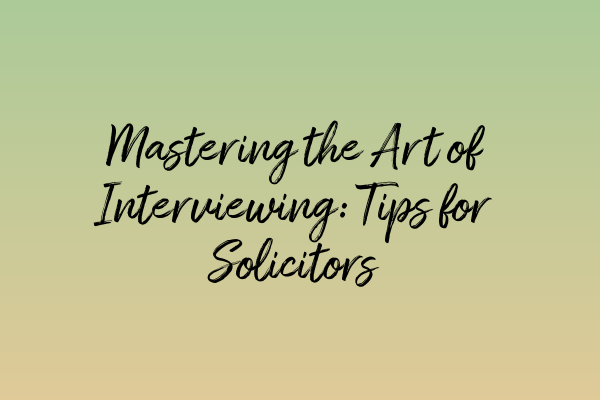Mastering the Art of Interviewing: Tips for Solicitors
As a solicitor, being able to conduct effective interviews is an essential skill. Whether you are interviewing clients, witnesses, or even potential employees, the ability to gather accurate and relevant information is crucial to the success of your practice. In this article, we will provide you with some valuable tips to help you master the art of interviewing.
1. Prepare Beforehand
Before diving into an interview, it is essential to do your research and prepare yourself. Familiarize yourself with all relevant case details, legal regulations, and any related articles, such as Solicitors Property Law: Key Principles and Practical Applications to ensure you have a solid understanding of the subject matter. This preparation will not only help you ask relevant questions but also allow you to respond effectively.
2. Establish Rapport
Building a positive rapport with the interviewee is crucial to gather accurate information. Begin the interview by creating a comfortable and welcoming environment. Use active listening skills, maintain eye contact, and show genuine interest in what they have to say. By establishing rapport, you will encourage interviewees to open up and provide you with more valuable insights.
3. Ask Open-Ended Questions
An effective interview is all about asking the right questions. Open-ended questions encourage interviewees to provide detailed and comprehensive answers. Avoid yes-or-no questions and focus on queries that require a more elaborate response. For example, instead of asking, “Did you witness the incident?” ask, “Can you describe what you saw during the incident?” This approach will allow you to gather more valuable information.
4. Active Listening
While asking questions is important, active listening is equally crucial. Pay attention to both verbal and non-verbal cues from the interviewee. This will not only help you understand their perspective but also enable you to ask follow-up questions that delve deeper into the subject matter. Demonstrating empathy and understanding through active listening will ensure a productive interview.
5. Take Detailed Notes
During the interview, it is essential to take detailed notes. These notes will serve as a reference point and help you recall important details later. Additionally, taking notes shows the interviewee that you value their input and are actively engaged in the process. However, be careful not to let note-taking distract you from actively listening and maintaining eye contact.
6. Adapt to Different Interview Styles
Every interviewee is unique, and they may have different communication styles. As a skilled solicitor, it is important to adapt to these styles and tailor your approach accordingly. Some interviewees may prefer a more formal and structured conversation, while others may respond better to a relaxed and informal approach. Being adaptable will foster better communication and ultimately yield better results.
7. Practice Active Non-Verbal Communication
Non-verbal communication is equally important during an interview. Your body language can convey a lot to the interviewee and significantly impact the overall interaction. Maintain an open and attentive posture, use appropriate facial expressions, and nod to show understanding. These non-verbal cues create a positive and engaging atmosphere, making the interviewee feel heard and valued.
8. Follow Up
After an interview, it is crucial to follow up with the interviewee. This not only shows your professionalism, but it also provides an opportunity to clarify any points that may need further clarification. Following up also demonstrates your commitment and genuine interest in the matter at hand.
Now that you have learned some valuable tips for mastering the art of interviewing as a solicitor, you can confidently approach any interview situation with ease and professionalism. Remember, preparation, active listening, and effective communication are key to conducting successful interviews. For more information on relevant topics, be sure to check out these articles:
- Environmental Considerations in Land Law: Staying Ahead of the Curve
- SQE Preparation for Property Practice: Mapping Out Your Strategy
- Updates in UK Property Laws: Key Changes and Implications
- Legal challenges in property transactions: A comprehensive guide
By continually refining your interviewing skills, you will become a more effective solicitor, enabling you to provide better representation and outcomes for your clients.


Leave a Reply